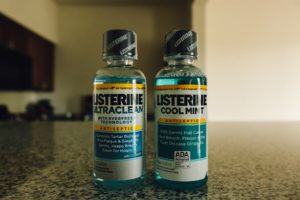 There are a lot of things we have grown up hearing are good for our teeth and mouth, that we take for granted are actually good for us. One of those things is mouthwash. Commercials and advertisements have long promoted mouthwash as the treatment for bad breath, a way to prevent cavities, prevent gum disease and more. So today let’s tackle the question: Is mouthwash good for you?
There are a lot of things we have grown up hearing are good for our teeth and mouth, that we take for granted are actually good for us. One of those things is mouthwash. Commercials and advertisements have long promoted mouthwash as the treatment for bad breath, a way to prevent cavities, prevent gum disease and more. So today let’s tackle the question: Is mouthwash good for you?
Yes, no, maybe
The answer is yes and no. There are mouthwashes that are good for your oral health and products that can potentially do harm. Before you load up on the latest and greatest mouthwash on the market, consider the great mouthwash debate. And then you can decide.
The good news
The good thing about mouthwash is that it can reach areas of your teeth you may miss with a toothbrush. Swirling mouthwash around in your mouth allows medicine to reach gum lines and the back corners of your mouth that are not as easily accessed by a toothbrush and flossing. That’s why dentists will sometimes suggest using mouthwash for cavity prevention or the treatment of gingivitis and bad breath.
For people who have been nicknamed Harry or Harriet Halitosis at the office, mouthwash offers an effective treatment for bad breath. Volatile sulfur compounds, also called VSCs are the big villain in bad breath. They result from a break-down of food, dental plague and bacteria. According to the American Dental Association, mouthwashes that contain antimicrobials with ingredients such as chlorhexidine, chorine dioxide, cetylpyridinium chloride (say that ten times fast) and essential oils, significantly reduce bad breath. Those same ingredients have also been shown to reduce plaque and gingivitis when you brush and floss. Fluoride is another common ingredient. It helps teeth remineralize, which prevents tooth decay and consequently cavities in children— even if they already use fluoridated toothpastes and drink fluoridated tap water.
Now the bad news
So, you understand the good news about mouthwash, now for the bad. The mouthwash products that are most effective at treating bad breath and gingivitis may leave you seeing yellow and brown. Those brands that combine chlorhexidine and cerylpyridinium chloride, along with zinc, can stain your teeth and tongue.
Don’t mess with the oral microbiome
Another criticism of mouthwash has to do with your mouth’s oral microbiome. This microbiome includes both good and bad bacteria, which support the mineralization of your teeth, encourage saliva production and prevents tooth decay. Mouthwashes that kill 99.9% of the bacteria in your mouth are also killing off good bacteria. This can damage the mouth’s microbiome and its ability to fight cavities, gingivitis and bad breath.
Do we use mouthwash or not?
Okay, so now what? Do we use mouthwash or not? There is certainly room in your oral hygiene repertoire for mouthwash but not just any mouthwash. Also, kids younger than the age of six should not be swirling and swishing anything stronger than water. Talk to your dentist first but in general, choose a mouthwash that is alcohol free. Alcohol wipes out bad (and good) bacteria, but it dries your mouth out in the process. That dryness can cause irritation in your oral tissues and exacerbate the very problems you were trying to treat. Be aware that mouthwashes with chlorhexidine and cerylpyridinium chloride, plus zinc are very likely to stain your teeth. Ask your dentist for alternatives. Another tip is to shop for mouthwashes that are PH balanced vs the highly acidic alcohol-based mouthwashes.
Or—just brush and floss like a boss
The best thing you can do for your teeth is to brush twice a day for at least two minutes, floss every evening and get regular cleanings at the dentist. Chances are, if you do this, you probably won’t ever need mouthwash. Every smile is unique as is every microbiome, so if you have any questions about which, if any, mouthwash to use– ask one our dentists.
